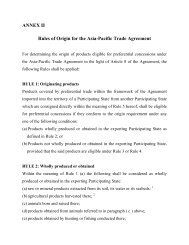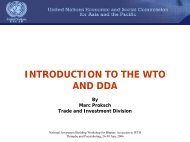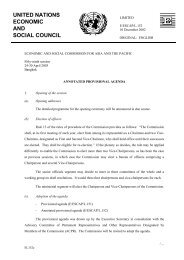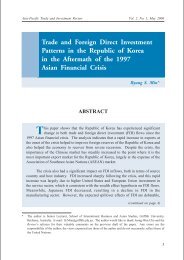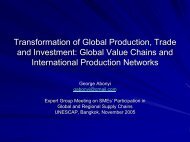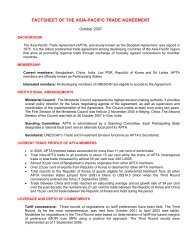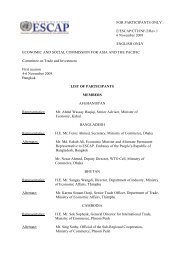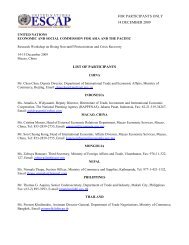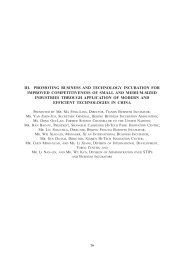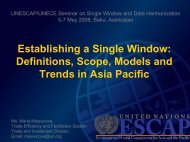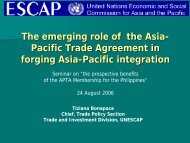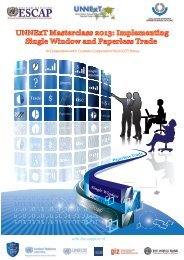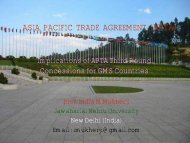country studies on bangladesh, nepal and sri lanka - Escap
country studies on bangladesh, nepal and sri lanka - Escap
country studies on bangladesh, nepal and sri lanka - Escap
Create successful ePaper yourself
Turn your PDF publications into a flip-book with our unique Google optimized e-Paper software.
STUDIES IN TRADE AND INVESTMENT 70<br />
Table 3: Global Competitiveness Index (GCI) 2010-2011<br />
Bangladesh Nepa l Sri Lanka<br />
Global Competitiveness 3.64 (107 th out of 3.34 (130 th out of 4.25 (62 nd out of<br />
Index – 2009-10 139 countries) 139 countries) 139 countries)<br />
Basic requirement sub index 3.71 (114 th ) 3.52 (125 th ) 4.42 (73 rd )<br />
2009-10<br />
Efficiency enhancers sub index 3.62 (97 th ) 3.14 (131 st ) 4.01 (69 th )<br />
2009-10<br />
Innovati<strong>on</strong> factors sub index 3.01 (109 th ) 2.67 (133 rd ) 3.97 (40 th )<br />
2009-10<br />
Comp<strong>on</strong>ents of basic requirement sub index:<br />
Instituti<strong>on</strong>s 3.24 (115 th ) 3.03 (130 th ) 4.06 (55 th )<br />
Infrastructures 2.15 (133 rd ) 1.81 (139 th ) 3.82 (70 th )<br />
Macroec<strong>on</strong>omic stability 4.49 (80 th ) 4.41 (86 th ) 3.60 (124 th )<br />
Health <strong>and</strong> primary educati<strong>on</strong> 4.96 (106 th ) 4.81 (109 th ) 6.18 (35 th )<br />
Source: WEF (2011).<br />
When GCI is decomposed into basic requirements, efficiency enhancers <strong>and</strong><br />
innovati<strong>on</strong> factors, Sri Lanka shows the prospect for innovati<strong>on</strong>-driven competitive<br />
strength, which can be observed in its <str<strong>on</strong>g>country</str<strong>on</strong>g> study <strong>on</strong> rubber products sector <strong>and</strong><br />
more explicitly in its electr<strong>on</strong>ic industry. The emphasis <strong>on</strong> new high value product lines<br />
also indicates the trend. Bangladesh looks to be moving towards the efficiency-driven<br />
category in which more efficient producti<strong>on</strong> processes <strong>and</strong> increases in quality are relied<br />
up<strong>on</strong>. Nepal looks like a factor-driven ec<strong>on</strong>omy when a <str<strong>on</strong>g>country</str<strong>on</strong>g> relies more <strong>on</strong> its factor<br />
endowments – primarily unskilled low-cost labour <strong>and</strong> natural resources, thus<br />
dem<strong>on</strong>strating dependence <strong>on</strong> the agriculture sector.<br />
16<br />
Further decompositi<strong>on</strong> of basic requirement index into two of its four major subcomp<strong>on</strong>ents<br />
(i.e., instituti<strong>on</strong>al capacity <strong>and</strong> infrastructures) shows that Bangladesh <strong>and</strong><br />
Nepal have severe limitati<strong>on</strong>s in these two comp<strong>on</strong>ents to be competitive enough –<br />
while Sri Lanka is in a better positi<strong>on</strong>. The <str<strong>on</strong>g>country</str<strong>on</strong>g> <str<strong>on</strong>g>studies</str<strong>on</strong>g> <strong>on</strong> Bangladesh <strong>and</strong> Nepal<br />
<strong>and</strong> their interacti<strong>on</strong>s at nati<strong>on</strong>al workshops had emphasized the need for infrastructure<br />
development – particularly electric power <strong>and</strong> gas lines in Bangladesh <strong>and</strong> rural roads<br />
in Nepal. While Sri Lanka shows the highest ranking in health <strong>and</strong> primary educati<strong>on</strong><br />
am<strong>on</strong>g the three countries, Bangladesh <strong>and</strong> Nepal dem<strong>on</strong>strate better rankings in<br />
macroec<strong>on</strong>omic stability.<br />
Sec<strong>on</strong>d, business envir<strong>on</strong>ment is closely related to the overall development level<br />
in these countries. SMEs need to have enabling operati<strong>on</strong>al envir<strong>on</strong>ment, including<br />
reas<strong>on</strong>able legal <strong>and</strong> instituti<strong>on</strong>al frameworks, stable macroec<strong>on</strong>omic policies <strong>and</strong><br />
adequate infrastructures. The World Bank’s Ease of Doing Business Index focuses <strong>on</strong><br />
nine topics that aim to measure the regulati<strong>on</strong> <strong>and</strong> red tape relevant to the life cycle<br />
of domestic SMEs. As such, a nati<strong>on</strong>’s ranking is based <strong>on</strong> the average of the following<br />
nine sub-indices: starting a business, dealing with c<strong>on</strong>structi<strong>on</strong> permits, registering



